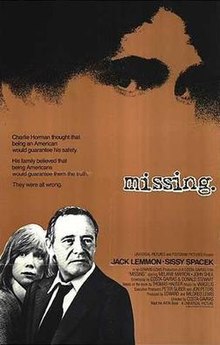
Back مفقود (فيلم) Arabic مفقود ARZ Missing (film, 1982) Breton Missing Catalan Vermißt (Film) German Ο Αγνοούμενος Greek Missing Esperanto Desaparecido (película) Spanish Missing (1982ko filma) Basque گمشده (فیلم ۱۹۸۲) Persian
| Missing | |
|---|---|
 Theatrical release poster | |
| Directed by | Costa-Gavras |
| Screenplay by | Costa-Gavras Donald E. Stewart |
| Based on | The Execution of Charles Horman: An American Sacrifice 1978 book by Thomas Hauser |
| Produced by | Edward Lewis Mildred Lewis |
| Starring | |
| Cinematography | Ricardo Aronovich |
| Edited by | Françoise Bonnot |
| Music by | Vangelis |
Production company | |
| Distributed by | Universal Pictures |
Release date |
|
Running time | 122 minutes |
| Country | United States[1] |
| Languages | English Spanish |
| Budget | $9.5 million[2] |
| Box office | $16 million (US)[3][4] |
Missing (stylized as missing.) is a 1982 American biographical thriller drama film directed by Costa-Gavras from a screenplay written by Gavras and Donald E. Stewart, adapted from the book The Execution of Charles Horman: An American Sacrifice (1978) by Thomas Hauser (later republished under the title Missing in 1982), based on the disappearance of American journalist Charles Horman, in the aftermath of the United States-backed Chilean coup of 1973, which deposed the democratically elected socialist President Salvador Allende.[2]
The film stars Jack Lemmon, Sissy Spacek, Melanie Mayron, John Shea, Janice Rule and Charles Cioffi. Set largely during the days and weeks following Horman's disappearance, it examines the relationship between Horman's wife Beth and his father Edmund and their subsequent quest to find Horman.
Missing was theatrically released on February 12, 1982 to critical acclaim. The film premiered at the 1982 Cannes Film Festival where it was jointly awarded the Palme d'Or (along with the Turkish film Yol), while Lemmon won the Best Actor prize. It received four nominations at the 55th Academy Awards; Best Picture, Best Actor (for Lemmon), Best Actress (for Spacek) and won Best Adapted Screenplay. The film created significant controversy in Chile and was banned during Augusto Pinochet's dictatorship; neither Chile nor Pinochet is mentioned by name, although the Chilean cities of Viña del Mar and Santiago are.[5]
- ^ "Estudios Churubusco". British Film Institute. Archived from the original on August 11, 2016. Retrieved March 22, 2021.
- ^ a b Wolf, William (February 1, 1982). "Costa-Gavras Goes to Hollywood". New York. p. 44.
- ^ "Missing (1982)". Box Office Mojo. Retrieved May 2, 2016.
- ^ Box Office Information for Missing. The Numbers. Retrieved March 27, 2013.
- ^ Ebert, Roger (January 1, 1982). "Missing (1982)". RogerEbert.com. Chicago Sun-Times. Retrieved March 16, 2017.